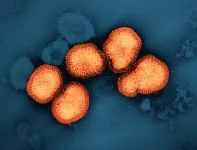(Press-News.org) Enrollment in a Phase 1 trial of a new investigational universal influenza vaccine candidate has begun at the National Institutes of Health’s Clinical Center in Bethesda, Maryland. The trial is sponsored by the National Institute of Allergy and Infectious Diseases (NIAID), part of the NIH, and will evaluate the investigational vaccine for safety and its ability to elicit an immune response.
Currently available seasonal influenza (or “flu”) vaccines are effective at preventing specific strains of influenza. Each year, the vaccines are re-evaluated and changed to best match the strains of flu predicted to be the most dominant in the upcoming flu season. Most seasonal flu vaccines are designed to train the immune system to defend against three or four different common strains of flu, but a “universal” influenza vaccine might someday provide protection against many more.
“An ideal universal influenza vaccine could be taken less frequently than once a year and protect against multiple strains of influenza virus. With each new universal influenza vaccine candidate and clinical trial, we take another step closer to that goal,” said Acting NIAID Director Hugh Auchincloss, M.D.
The vaccine candidate under investigation, FluMos-v2, was designed by researchers at NIAID’s Vaccine Research Center (VRC). It is an adaptation of an earlier universal flu vaccine candidate, FluMos-v1, which began first-in-human testing in 2021 and is still undergoing trials. FluMos-v2 is designed to induce antibodies against many different influenza virus strains by displaying part of the influenza virus hemagglutinin (HA) protein in repeating patterns on self-assembling nanoparticle scaffolds. Exposure to these harmless fragments of virus proteins prepares the immune system to recognize and fight the actual virus. When tested in animals, the experimental vaccine resulted in robust antibody responses.
While the FluMos-v1 vaccine candidate displays HA from four strains of influenza virus, FluMos-v2 displays HA from six: four influenza A viruses and two influenza B viruses. The researchers anticipate that this will further broaden vaccine recipients’ immunity, providing protection against a wider variety of influenza viruses.
The new clinical trial is expected to enroll 24 healthy volunteers, aged 18-50 years, who will receive two intramuscular injections of the FluMos-v2 vaccine candidate. These injections will be given 16 weeks apart. At first, participants will be enrolled in the lower dose group (60 mcg per vaccination). If no safety concerns are identified after at least three participants have received this dose, enrollment will begin in the higher dose (180 mcg per vaccination) group. The study team plans to enroll 12 participants into each dosage group.
For 40 weeks after their first vaccination, participants will receive regular follow-up phone calls and examinations to track their responses to the experimental vaccine. Blood samples will be taken during study visits to measure any immune responses to the vaccine candidate.
Further information about the trial is available at ClinicalTrials.gov using the identifier NCT05968989.
NIAID conducts and supports research—at NIH, throughout the United States, and worldwide—to study the causes of infectious and immune-mediated diseases, and to develop better means of preventing, diagnosing and treating these illnesses. News releases, fact sheets and other NIAID-related materials are available on the NIAID website.
About the National Institutes of Health (NIH): NIH, the nation's medical research agency, includes 27 Institutes and Centers and is a component of the U.S. Department of Health and Human Services. NIH is the primary federal agency conducting and supporting basic, clinical, and translational medical research, and is investigating the causes, treatments, and cures for both common and rare diseases. For more information about NIH and its programs, visit www.nih.gov.
NIH...Turning Discovery Into Health®
END
A University of Massachusetts Amherst neuroscientist has been awarded a $3.1 million grant from the National Institute of Neurological Disease and Stroke to advance knowledge on human brain development by using an unusual subject: the brain of the sea slug.
This tiny invertebrate is an ideal candidate to study for brain development because it adds a countable number of neurons to its brain – the number increases more than 40-fold in less than eight weeks to a total of about 10,000 neurons – while the animal grows and performs behaviors, ...
North Carolina State University researchers have successfully transferred an important gene from one compartment of a plant cell to another to produce tobacco plants that lack pollen and viable seeds, while otherwise growing normally. Their findings could lead to better ways of producing hybrid seeds to maximize crop productivity, or to introduce seedlessness in fruit species lacking the often-desired trait, such as raspberries, blackberries or muscadine grapes.
The researchers began the work in the energy-producing portion of a cell, the mitochondria. In plants, aberrations within the mitochondrial genome can be associated with ...
A research project supported by FAPESP shows that the construction of new hydroelectric power plants in Brazil’s South region could have an impact on more than 30% of the habitat of Phrynops williamsi, the Williams’ side-necked turtle. The species occurs only in areas of Atlantic Rainforest and Pampa (the grassland biome adjacent to Brazil’s border with Uruguay and Argentina), and is classed as “Vulnerable” (facing a high risk of extinction) by the International Union for Conservation of Nature (IUCN).
An article on the study is published in the Journal of Applied Ecology by ...
(BOSTON)—The National Institutes of Health/National Institute on Aging recently awarded a $13.7 million grant to a project led by Boston University Chobanian & Avedisian School of Medicine principal investigators Lindsay Farrer, PhD, chief of biomedical genetics and distinguished professor of genetics, and Richard Sherva, PhD, assistant professor of medicine in biomedical genetics, for research using whole genome sequencing and other approaches to identify genetic factors for Alzheimer disease (AD) in Jews currently living in ...
WEST LAFAYETTE, Ind. – A Purdue researcher is taking a giant leap forward in the fight against drug-resistant strains of malaria in developing countries.
Open Philanthropy has awarded $1.38 million to Philip Low to further validate a drug therapy that he and his colleagues have previously shown to successfully treat the disease. Low (rhymes with “now”) is Purdue University’s Presidential Scholar for Drug Discovery and the Ralph C. Corley Distinguished Professor of Chemistry in the College of Science.
For years, experts ...
CHAMPAIGN, Ill. — New research led by data science experts at the University of Illinois Urbana-Champaign and United Nations Global Pulse found that there is no strong evidence that YouTube promoted anti-vaccine sentiment during the COVID-19 pandemic.
The study, published in the Journal of Medical Internet Research, performed an algorithmic audit to examine if YouTube’s recommendation system acted as a “rabbit hole,” leading users searching for vaccine-related videos to anti-vaccine content.
For the study, the researchers asked World Health Organization-trained participants and workers from Amazon Mechanical Turk to intentionally ...
A team of scientists, led by researchers at UCL, have developed new methods to predict outcomes for pregnancies where there are issues with poor growth of the baby inside the womb.
The research, published in the Journal of Clinical Investigation, involved 142 women from the EVERREST Prospective Study* who had severe early-onset fetal growth restriction (FGR) – meaning their babies were very small on ultrasound scans early in the second half of pregnancy (between 20 and 27 weeks).
Fetal growth restriction affects approximately ...
Sage offers journalists free access to the articles in all of our 1,100 journals upon request. You can submit your request via this form or contact pr@sagepub.co.uk for more information.
Sage also provides paywall-free links to the Sage articles journalists cite so the audience can read the underlying scholarship for free. To get a paywall-free link to an article in Sage journals, please email pr@sagepub.co.uk with the name of the article and the journal one business day ahead of the publication of the article.
Sage has pledged to improve access to our research both to bridge ...
Health systems science is an emerging field that focuses on how care is delivered, how health professionals collaborate, and how the health system can improve patient care and health care delivery. The Virginia Tech Carilion School of Medicine (VTCSOM) is a leader in both its education and its research in health systems science. Both are evident in two recently awarded grants from the American Medical Association to study ways to enhance health systems science education, one at the medical education ...
In a new study published on 26 July 2023, in the journal Environmental Science and Ecotechnology, researchers from Harbin Institute of Technology, have developed a novel double Z-scheme photocatalyst, called the molecularly imprinted TiO2@Fe2O3@g-C3N4 (MFTC) composite, that selectively removes SMX from water.
Traditional photocatalytic methods have faced challenges with selectivity, often causing the indiscriminate degradation of organic pollutants and coexisting contaminants at high concentrations. However, the MFTC composite was purposefully designed to overcome this limitation by incorporating molecularly imprinted sites on its surface. These specialized ...








